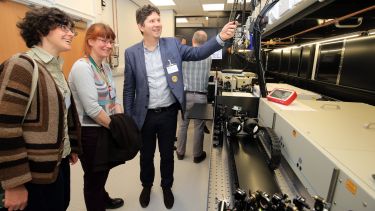The Lord Porter Ultrafast Laser Spectroscopy Laboratory has been named after Lord George Porter, one of the four Nobel Prize winners who have worked or studied in our department. It was officially opened by his widow, Lady Stella Porter.
The facility has been designed to help accelerate research in a variety of areas including charge and energy transport in molecules and materials, ultrafast electronic, vibronic and structural dynamics, solar cells, artificial photosynthesis, biological imaging and light-induced therapies in healthcare.
It was funded through an Engineering and Physical Sciences Research Council (EPSRC) Capital Equipment Award, and will enhance pioneering interdisciplinary and collaborative research projects from the University of Sheffield’s Grantham Centre for Sustainable Futures, the Imagine: Imaging Life project, the Krebs Institute, and more.
The official opening took place as part of a scientific meeting to launch the facility, which is led by Professor Julia Weinstein and Dr Dimitri Chekulaev.
The event included talks by esteemed scientists including Michael Wasielewski from Northwestern University in the USA, David Phillips from Imperial College London and Anthony Parker from Rutherford Appleton Laboratory.
About Lord Porter
Lord Porter was our Professor of Physical Chemistry between 1955 and 1966 and is one of four Nobel Prize winners who have worked or studied in our department.
He shared the Nobel Prize in Chemistry in 1967 with Ronald G.W. Norrish and Manfred Eigen for their discovery of flash photolysis, a technique which enabled chemists for the first time to measure the speed and mechanism of certain reactions that occurred too quickly for detection by conventional methods.



